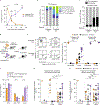Subsets of exhausted CD8+ T cells differentially mediate tumor control and respond to checkpoint blockade
- PMID: 30778252
- PMCID: PMC6673650
- DOI: 10.1038/s41590-019-0312-6
Subsets of exhausted CD8+ T cells differentially mediate tumor control and respond to checkpoint blockade
Erratum in
-
Author Correction: Subsets of exhausted CD8+ T cells differentially mediate tumor control and respond to checkpoint blockade.Nat Immunol. 2019 Nov;20(11):1556. doi: 10.1038/s41590-019-0528-5. Nat Immunol. 2019. PMID: 31582823 Free PMC article.
Abstract
T cell dysfunction is a hallmark of many cancers, but the basis for T cell dysfunction and the mechanisms by which antibody blockade of the inhibitory receptor PD-1 (anti-PD-1) reinvigorates T cells are not fully understood. Here we show that such therapy acts on a specific subpopulation of exhausted CD8+ tumor-infiltrating lymphocytes (TILs). Dysfunctional CD8+ TILs possess canonical epigenetic and transcriptional features of exhaustion that mirror those seen in chronic viral infection. Exhausted CD8+ TILs include a subpopulation of 'progenitor exhausted' cells that retain polyfunctionality, persist long term and differentiate into 'terminally exhausted' TILs. Consequently, progenitor exhausted CD8+ TILs are better able to control tumor growth than are terminally exhausted T cells. Progenitor exhausted TILs can respond to anti-PD-1 therapy, but terminally exhausted TILs cannot. Patients with melanoma who have a higher percentage of progenitor exhausted cells experience a longer duration of response to checkpoint-blockade therapy. Thus, approaches to expand the population of progenitor exhausted CD8+ T cells might be an important component of improving the response to checkpoint blockade.
Figures







Comment in
-
States of exhaustion.Nat Rev Cancer. 2019 Apr;19(4):185. doi: 10.1038/s41568-019-0129-5. Nat Rev Cancer. 2019. PMID: 30846872 No abstract available.
References
Publication types
MeSH terms
Substances
Grants and funding
LinkOut - more resources
Full Text Sources
Other Literature Sources
Molecular Biology Databases
Research Materials

